| Reviews & Columns |
|
Reviews DVD TV on DVD Blu-ray 4K UHD International DVDs In Theaters Reviews by Studio Video Games Features Collector Series DVDs Easter Egg Database Interviews DVD Talk Radio Feature Articles Columns Anime Talk DVD Savant Horror DVDs The M.O.D. Squad Art House HD Talk Silent DVD
|
DVD Talk Forum |
|
|
| Resources |
|
DVD Price Search Customer Service #'s RCE Info Links |
|
Columns
|
|
|
Antibodies (2 Disc Special Edition)
The Movie
The world is unfair, notes serial killer Gabriel Engel, because history has a funny way of glorifying the killers who really don't deserve that much credit. Jack the Ripper? A paltry five. Charles Manson? He had others do his dirty work. How then does Engel (André Hennicke) fit in with his 13 child murders? His latest victim flatlines just as the police burst into his apartment in the gripping eight-minute opening of Antibodies (Antikörper), the 2005 German thriller from director Christian Alvart.
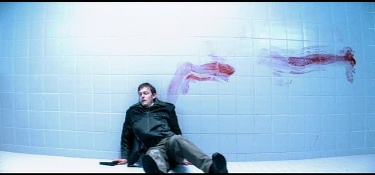 |
| |
It's a pulse-pounding start that immediately grabs the viewer, jolting their senses and setting the tone for a chilling experience. While the villain is captured at the beginning, it's provides a false sense of security. The opening proves that anything goes, and it's the threat of violence--not so much the act itself--that permeates every frame of the film's two-plus hours.
German police have been trying to find the "Crucifix Killer" for six years, and the success in Berlin has everyone breathing a sign of relief. But in the countryside of Herzbach, town constable Michael Martens (Wotan Wilke Möhring) isn't so sure. He has been haunted by the murder of local 12-year-old Lucia Flieder nearly two years ago (scenes of the events regarding the case are presented in flashbacks), and has recently ordered the townspeople to provide saliva samples in an effort to find the killer. Engel's capture seems to put the town at ease, but because all of his victims were boys, Martens--a married father of two, farmer and devout Catholic that residents have dubbed "Holy Saint Michael"--wants to question the criminal himself to get to the truth.
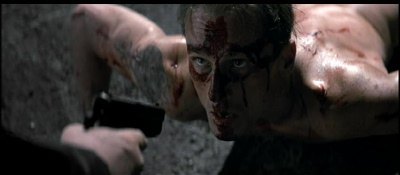 |
| |
With the help of Chief Commissioner Seiler (Heinz Hoenig) from Berlin, Martens gets his wish, and is soon face-to-face with evil incarnate. But Engel won't answer questions easily, and his efforts to unease Martens succeed--not only does the family man start to question the case, but also his faith and devotion. And life has already been full of problems for Martens: He and his wife (Ulrike Krumbiegel) sleep in separate beds, and his overbearing father-in-law (Jürgen Schornagel) is making every minute a living hell. And most troubling is the behavior of 13-year-old son Christian (Hauke Diekamp), who has been showing some troubling signs: sexual scribbling, issues at school, bed wetting, playing with fire and a possible penchant for animal cruelty.
When Martens and Seiler decide to search Engel's apartment, they stumble upon new evidence that eventually takes the case into unexpected territory. Meanwhile, the now wheelchair-ridden Engel has been spending his cell time scribbling in his notebook, and using crayons to draw on his cell wall. No longer able to use the blood of his own victims to create paintings, he sometimes uses his own. And just what is the significance of those red squares he scribbles on the wall?
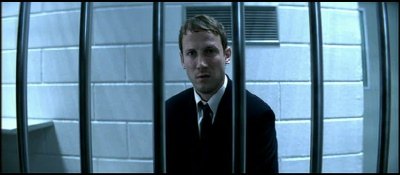 The tension builds slowly to an eventual fever pitch, and Alvart has crafted a highly disturbing and thought-provoking piece that works as both a thriller and as a psychological study. Alvart isn't concerned with glorifying Engel; despite obvious comparisons to The Silence of the Lambs (acknowledged in a brief, humorous exchange between the leads), Engel is no Hannibal Lecter, and is never painted in a light that would have viewers root for him. This film shares more with David Cronenberg's A History of Violence, released the same year. Both films examine the root of evil and the capacity for people to break, and use a father/son relationship to explore the dynamics. What would lead an otherwise "normal" person to act violently? Is everyone born with evil in them? There are also many religious parallels running through the story, and Alvart uses one Bible passage to haunting effect toward the conclusion.
The tension builds slowly to an eventual fever pitch, and Alvart has crafted a highly disturbing and thought-provoking piece that works as both a thriller and as a psychological study. Alvart isn't concerned with glorifying Engel; despite obvious comparisons to The Silence of the Lambs (acknowledged in a brief, humorous exchange between the leads), Engel is no Hannibal Lecter, and is never painted in a light that would have viewers root for him. This film shares more with David Cronenberg's A History of Violence, released the same year. Both films examine the root of evil and the capacity for people to break, and use a father/son relationship to explore the dynamics. What would lead an otherwise "normal" person to act violently? Is everyone born with evil in them? There are also many religious parallels running through the story, and Alvart uses one Bible passage to haunting effect toward the conclusion.
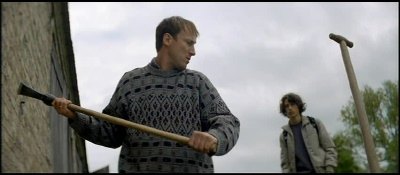 This is clearly not everyone's cup of tea; the child-killer/sexual predator theme will turn many people off. But this isn't as visually violent a film as it may seem; there are no extreme, graphic, gory murders, although a few disturbing images creep in. This is much more about the psychology of a killer, the motives of evil and a man's inner struggle--the mystery is almost secondary. And while Engel is the flashier character, this is Martens' story all the way. Möhring navigates this tough role with brilliance, bringing a wide range of depth and emotion to a character struggling with himself. His face-offs with Engel are the most entertaining sequences in the film, providing tense verbal battles that shake the foundation of Martens' beliefs.
This is clearly not everyone's cup of tea; the child-killer/sexual predator theme will turn many people off. But this isn't as visually violent a film as it may seem; there are no extreme, graphic, gory murders, although a few disturbing images creep in. This is much more about the psychology of a killer, the motives of evil and a man's inner struggle--the mystery is almost secondary. And while Engel is the flashier character, this is Martens' story all the way. Möhring navigates this tough role with brilliance, bringing a wide range of depth and emotion to a character struggling with himself. His face-offs with Engel are the most entertaining sequences in the film, providing tense verbal battles that shake the foundation of Martens' beliefs.
This is also a visually gorgeous movie, led by the stunning cinematography of Hagen Bogdanski (who went on to lens The Lives of Others, which won the Oscar for Best Foreign Language Film in 2007). The film's most unforgettable shot comes in one of the flashbacks, when the unformed Martens makes a discovery on a pier. The aerial shot is beautiful and then haunting, bathed in shades of green that seem to hint at innocence while also enveloping evil.
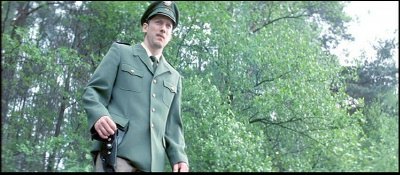 |
| |
As for the ending? It's not for everyone, and is bound to disappoint some viewers. But it's sometimes refreshing when something goes where you weren't expecting it to.
The DVD
Video:
Presented in an anamorphic-enhanced 2.35:1 transfer, this is an overall-solid effort. The biggest issue is some grain, which seems to be Alvart's intent. As he explains in the extras, he filmed the movie using different techniques for the city scenes and the countryside scenes. For the city he used a "bleach bypass" process that has intentional high contrast, with very dark darks and highlights almost blown out. The village scene were untreated, with very warm color timing ("it leaves something in the negative that is not intended to stay there," he notes). The film comes with irremovable English subtitles.
Sound:
Two options are available: 2.0 and 5.1 German audio tracks. The bulk of this movie is dialogue driven, without much chance for dynamic audio tricks. But the ones that are here--especially during the opening sequence--provide a nice jolt.
Extras:
The first disc of this two-disc special edition houses two trailers. The second disc starts with "Evil is a Virus" (29:19), an interview with Alvart about his experience making the film, as well as his thoughts on the material. It's a spoiler-filled extra, so don't watch until you finish the movie. Alvart provides many interesting stories about the film and casting it (the actor who plays the main cop in the opening sequence is a friend who doesn't speak any German), as well as the genesis and psychology of the story. It's interesting to hear how he wanted to visually portray life in the two different settings, and how he wanted Engel to be presented. He goes into the duality present throughout the story, and how important it was to present contrasting extremes (in both a visual and a script sense). Alvart also shares some of his own life and how that influenced the film, and finishes by sharing some thoughts on the controversial ending.
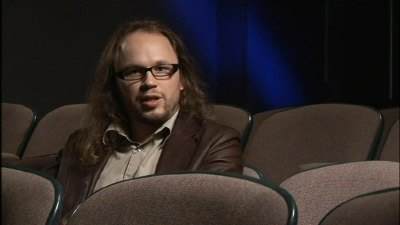 |
| |
Up next is Making of Antibodies (29:13), which is pretty much just clips of the cast and crew sharing various thoughts on the film. This feature has some repetition from the first one, and doesn't have the same flow and structure; it jumps around a lot. It would have been nice to see more true behind-the-scenes footage and thoughts on making the film form a visual and technical perspective, but it still has plenty of interesting nuggets.
Rounding out the second disc are deleted scenes that run together (10 clips, 10:45)--none are really needed in the final cut, although two of them are interesting--and outtakes (2:48), which provide a brief escape from the seriousness of the story.
Final Thoughts:
Be warned: the subject matter of a child serial killer means this isn't for everyone; extreme gorehounds will also be disappointed. This isn't a horror film at heart, but a dramatic, psychological thriller that is highly engrossing study of evil and the inner struggles of a man beginning to crumble. Led by an outstanding performance from Möhring, this is a visually striking work that stays with you long after the last frame has flashed across the screen. As for that ending? It will probably divide the crowd. Highly Recommended.
|
| Popular Reviews |
| Sponsored Links |
|
|
| Sponsored Links |
|
|
| Release List | Reviews | Shop | Newsletter | Forum | DVD Giveaways | Blu-Ray | Advertise |
|
Copyright 2024 DVDTalk.com All Rights Reserved. Legal Info, Privacy Policy, Terms of Use,
Manage Preferences,
Your Privacy Choices | |||||||












